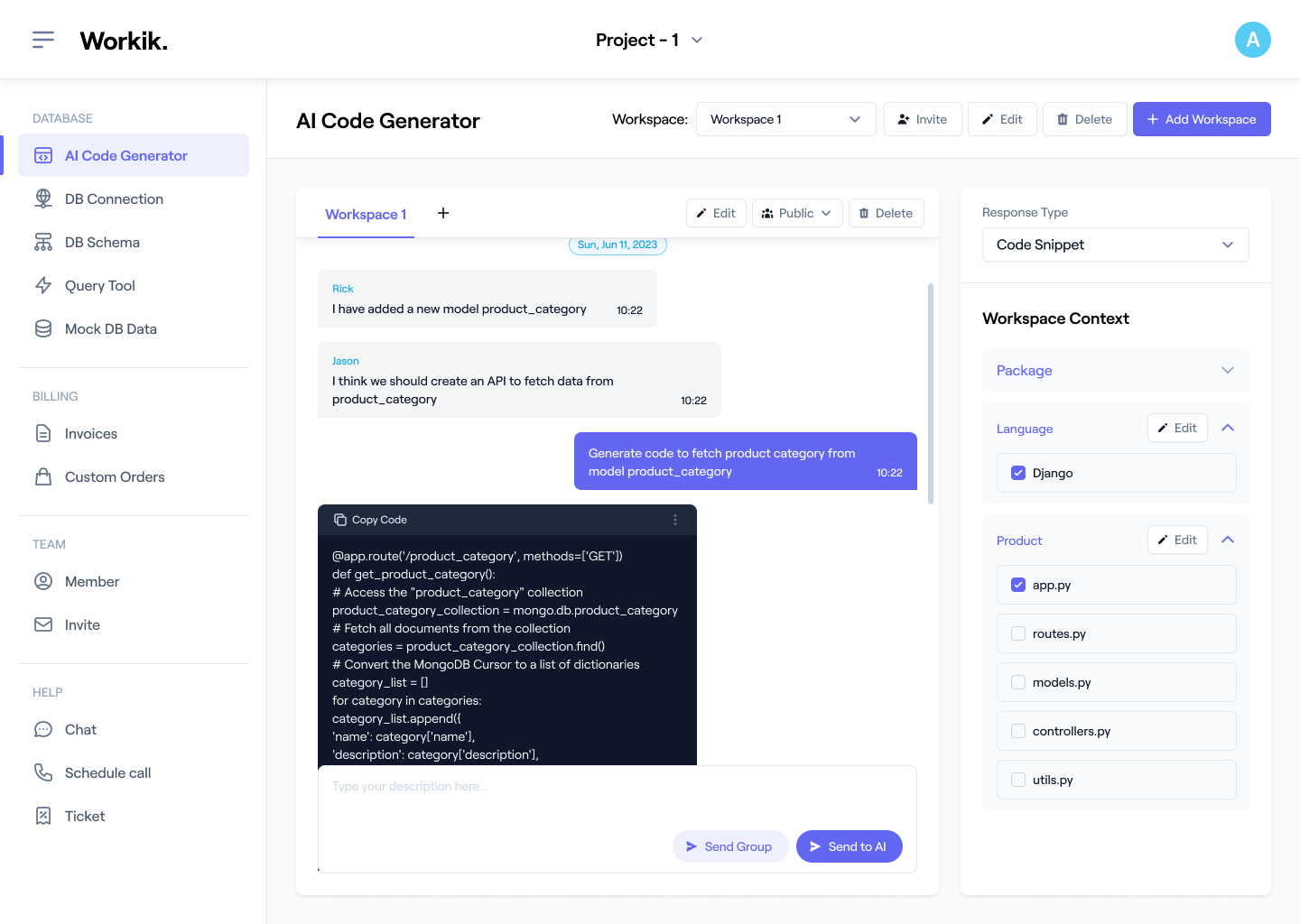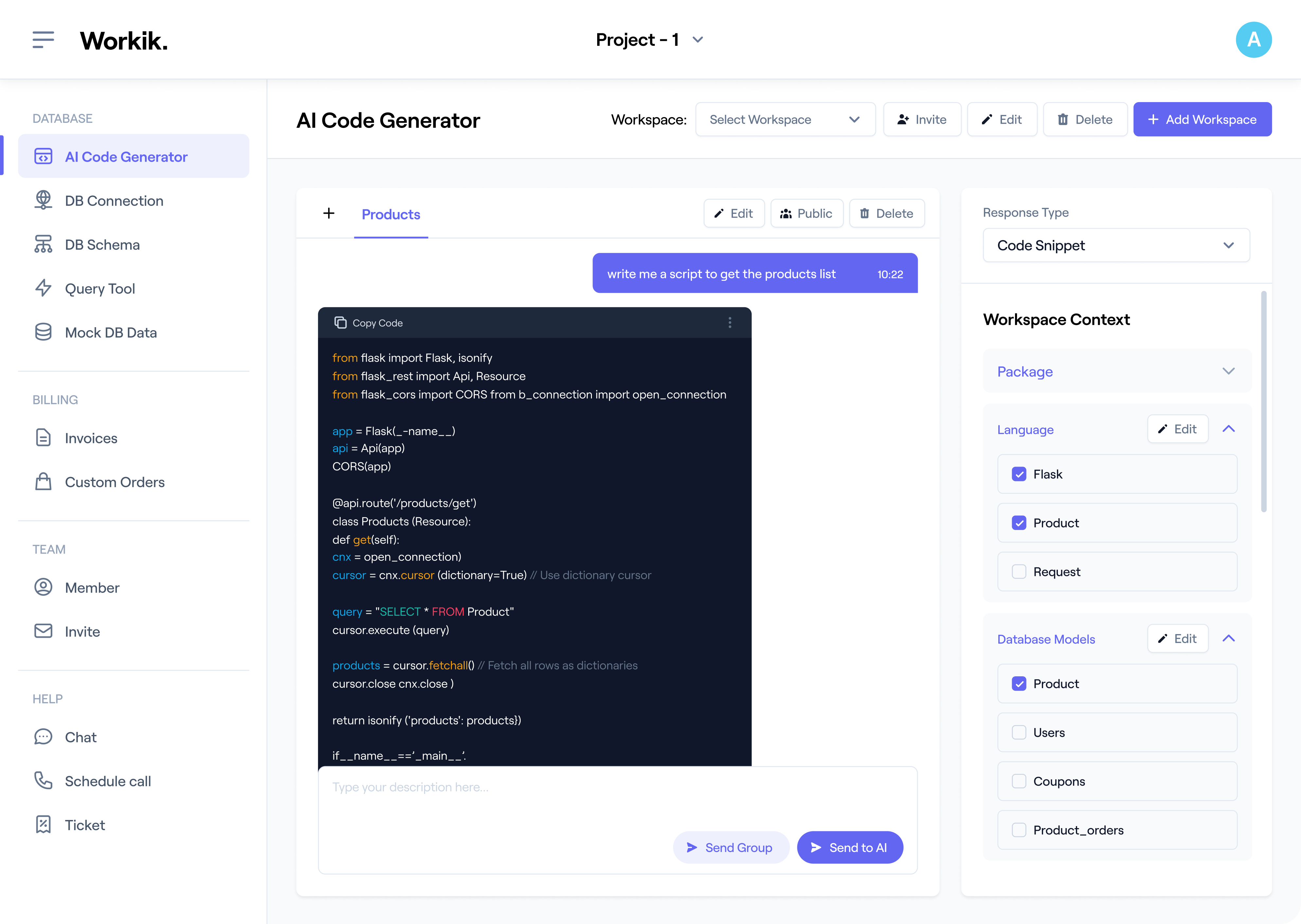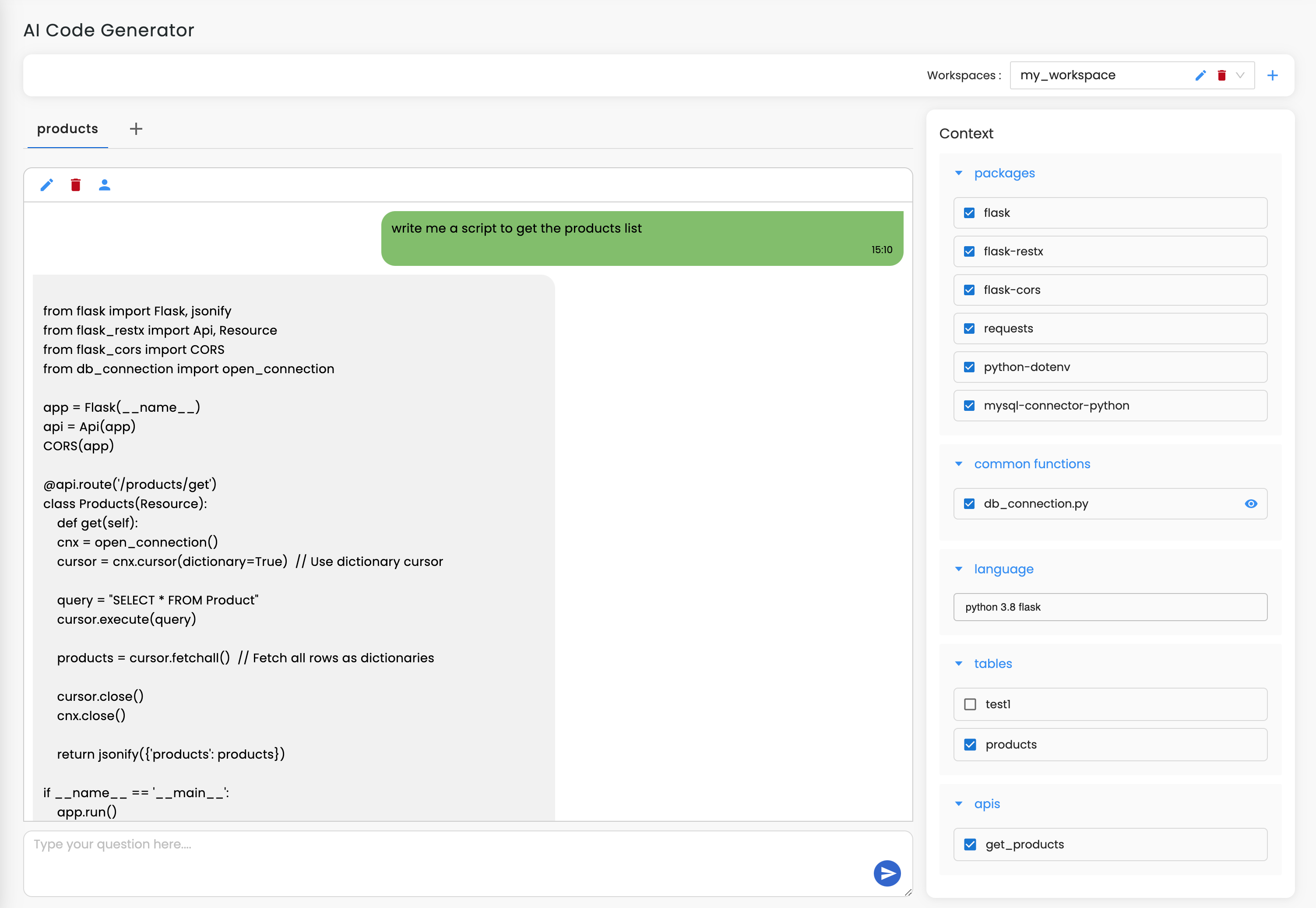Join our community to see how developers are using Workik AI everyday.
Supported AI models on Workik
GPT 5.2, GPT 5.1 Codex, GPT 5.1, GPT 5 Mini, GPT 5, GPT 4.1 Mini
Gemini 3 Flash, Gemini 3 Pro, Gemini 2.5 Pro, Gemini 2.5 Flash
Claude 4.5 Sonnet, Claude 4.5 Haiku, Claude 4 Sonnet, Claude 3.5 Haiku
Deepseek Reasoner, Deepseek Chat, Deepseek R1(High)
Grok 4.1 Fast, Grok 4, Grok Code Fast 1
Models availability might vary based on your plan on Workik
Features

Generate On-Chain Logic
AI builds secure contract functions using patterns like modifiers, events, & access control logic.

Structure External Interactions
Connect with oracles and contracts using AI-structured delegate calls, ABI links, and failover patterns.

Create Unit Tests Fast
Build Hardhat or Foundry-based tests with AI that simulate roles, mocks, and more.

Refactor for Upgradeability
AI rewrites contracts to follow UUPS or Transparent Proxy patterns while preserving storage layout.
How it works
Register with Google or email to access Workik’s AI-powered smart contract tools built for blockchain development.
Link your GitHub, GitLab, or Bitbucket repo, define Solidity or Vyper versions, and add frameworks like Hardhat, Foundry, or more to fine-tune AI assistance.
Use AI to generate smart contract logic, refactor legacy code, optimize gas usage, debug for vulnerabilities, and integrate oracles like Chainlink with guided precision.
Invite your team to audit contracts, test using Hardhat or Foundry, and deploy across Ethereum, Polygon, or BSC with CI integration.


Expand
.png)
.png)
Expand


Expand


Expand


Expand


Expand


Expand


TESTIMONIALS
Real Stories, Real Results with Workik
I generated DAO voting logic and proposal flow in minutes. The AI understood the entire governance model.

Leah Tan
Web3 Developer
It helped me set up upgradeable contracts using UUPS pattern without touching boilerplate. Total time-saver.

Carlos Nguyen
Blockchain Architect
I used it to debug my ERC20 staking contract and the AI pointed out a critical access control gap instantly.

Daniel Brooks
Solidity Developer
What are some popular use cases of Workik’s AI-powered Smart Contract Generator?


Workik’s AI-powered Smart Contract Generator is widely used across blockchain development. Some common use cases include but are not limited to:
• Generate ERC-20, ERC-721, and ERC-1155 tokens for DeFi and NFT platforms
• Create staking and yield contracts with automated reward distribution
• Build DAO voting logic and time-locked execution for governance systems
• Structure multisig wallets and escrow contracts with custom modifiers
• Use AI to detect gas inefficiencies and reentrancy issues with Slither
What context-setting options are available in Workik’s AI for Smart Contract Generation?


Workik enables deep context-setting for precise AI output in smart contract workflows:
• Sync repositories via GitHub, GitLab, or Bitbucket for contract imports
• Define frameworks like Hardhat, Foundry, or Truffle for testing and deployment
• Specify Solidity or Vyper versions to match project dependencies
• Add OpenZeppelin modules for role control and proxy compatibility
• Set target networks such as Ethereum, Polygon, or BSC for deployment
• Include Chainlink oracles to enable off-chain data within smart contracts
Does Workik support tokenomics modeling inside smart contracts?


Yes, Workik generates contracts with deflationary logic, tax fees, auto-liquidity, and burn mechanisms. Ideal for launchpads and community tokens, it helps visualize logic to avoid distribution flaws.
How does Workik assist with DAO treasury and spending control contracts?


Workik builds treasury contracts with multisig, time-locked execution, and milestone-based releases. Roles and permissions are structured efficiently for secure DAO fund management.
How does Workik support rapid prototyping for Web3 startups?


Workik lets you quickly test, deploy, and iterate smart contracts. Whether building DeFi flows or NFT minting, AI speeds up development without sacrificing quality.
Can Workik help simulate permission escalation or access control bugs?


Yes, Workik flags inconsistencies in access control logic and simulates edge cases like role overlaps or misconfigured fallback permissions. This is particularly useful when using AccessControl or Ownable for complex DAO or treasury systems that require tight operational control.
How can Workik support security-focused development teams?


Workik adheres to secure Solidity patterns including checks-effects-interactions, require guards, and modular modifiers. It integrates static analysis tools like Slither and MythX, and generates test cases for known vulnerability classes.
Can’t find the answer you are looking for?
Request question

Generate Code For Free

SMART CONTRACTS: Question & Answer
Smart contracts are self-executing programs on blockchains that enforce predefined rules without intermediaries. They are commonly written in Solidity or Vyper and deployed on Ethereum or other EVM-compatible chains to automate token transfers, governance, and DeFi protocols.
Popular tools in smart contract development include:
•
Languages:
Solidity, Vyper, Rust, Move
•
Frameworks:
Hardhat, Foundry, Truffle, Anchor, Remix IDE
•
Libraries:
OpenZeppelin, Chainlink, Uniswap SDK
•
APIs:
Infura, Alchemy, QuickNode
•
Tools:
Ganache, Hardhat Network, Tenderly, Etherscan
•
Testnets:
Goerli, Sepolia, Mumbai, Fuji, Base Goerli
Smart contracts are used to automate and secure various blockchain-based workflows such as:
•
DeFi:
Lending platforms, staking pools, liquidity farms, and decentralized exchanges (DEXs)
•
NFTs:
Minting, metadata management, and royalty enforcement via ERC-721 and ERC-1155
•
DAOs:
Governance voting, treasury control, and quorum-based decision making
•
Tokenization:
Launch of ERC-20 tokens, stablecoins, and fractionalized assets
•
Gaming:
In-game economies, NFT-based assets, and reward distribution logic
•
Escrow & Payments:
Conditional transfers and milestone-based disbursements
Smart contract professionals work as Solidity Developers, Smart Contract Auditors, DeFi Engineers, Web3 Developers, and Blockchain Architects. These roles involve building, testing, and securing decentralized applications, protocols, and contract-based infrastructure across various blockchain platforms.
Workik AI enhances every stage of smart contract development with:
•
Smart Contract Generation:
Build ERC-20, ERC-721, multisig, and proxy contracts with AI guidance
•
Gas Optimization:
Refactor loops, storage writes, and function structures for minimal gas usage
•
Security Audits:
Detect reentrancy, unchecked calls, and access control misconfigurations
•
Testing and Debugging:
Generate Foundry and Hardhat tests with mocks and simulated roles
•
Deployment Automation:
Deploy to Ethereum, Polygon, and BSC with generated scripts and configs
•
Upgradeable Architecture:
Scaffold UUPS and Transparent Proxy contracts with proper initializer logic
•
Refactoring:
Modernize legacy contracts, update Solidity versions, improve readability
•
Documentation:
Auto-generate NatSpec comments, ABI overviews, and developer documentation
Explore more on Workik
Top Blogs on Workik
Get in touch
Don't miss any updates of our product.
© Workik Inc. 2026 All rights reserved.

